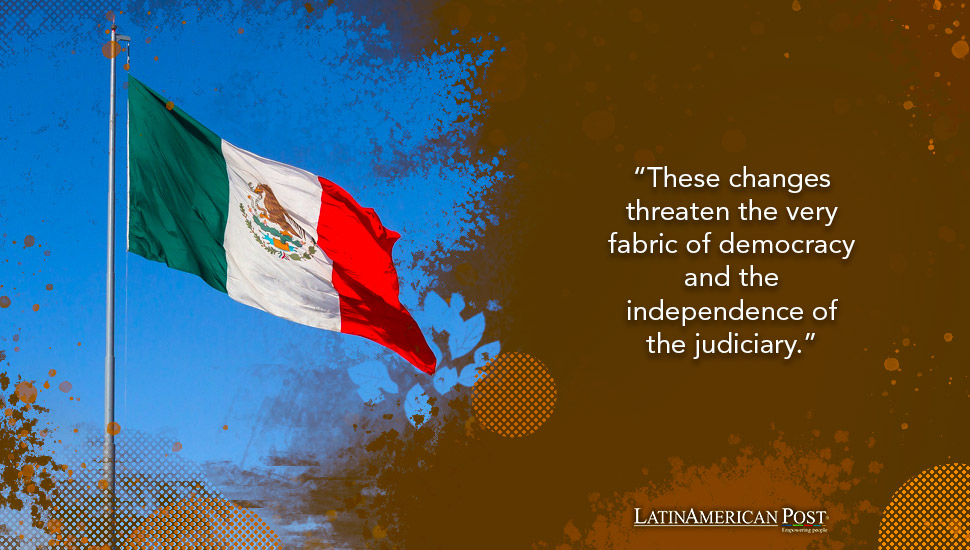Mexico’s Judicial Reforms are Indefensible

Any move towards authoritarianism is indefensible, and Mexico’s proposed judicial reforms are a clear step in that direction. These changes threaten the very fabric of democracy and the independence of the judiciary, which are crucial for a free society.
This week, Mexico’s President Andrés Manuel López Obrador and his elected successor, Claudia Sheinbaum, vigorously defended their proposed judicial overhaul amidst growing concerns. The debate over these reforms has been intensifying in recent months, with domestic and international critics warning that the changes—most notably the proposal to elect all judges by popular vote—could lead Mexico down a dangerous path towards authoritarianism.
The recent addition of a central U.S. business lobby to the chorus of criticism has only heightened fears that these reforms threaten the independence of the judiciary, a cornerstone of Mexico’s democratic system for decades. López Obrador and Sheinbaum’s staunch defense of the overhaul has done little to ease these concerns; instead, it has deepened the apprehension that Mexico is edging closer to a scenario where the executive branch wields unchecked power over other institutions. In this context, it is crucial to recognize why any move towards authoritarianism is indefensible and understand how these judicial reforms pose a significant threat to Mexico’s democratic fabric.
One of the most alarming aspects of López Obrador’s proposed judicial reforms is the plan to elect all judges by popular vote. While this may appear to be a democratic measure on the surface, it seriously threatens the judiciary’s independence. Judicial independence is a cornerstone of any functioning democracy. It ensures that the courts can operate without undue influence from the executive or legislative branches of government.
Electing judges by popular vote would fundamentally alter the judiciary’s nature, making it susceptible to political pressures and undermining its ability to act as an impartial arbiter of the law. Judges accountable to the electorate may feel compelled to make decisions that align with public opinion rather than the law. This leads to a system where justice is determined by popular sentiment rather than legal principles.
Furthermore, in a country like Mexico, where corruption and organized crime are pervasive, the election of judges by popular vote could open the door to even greater levels of interference in the judicial process. As U.S. Ambassador Ken Salazar pointed out, this reform could expose the judiciary to the influence of organized crime, jeopardizing the rule of law and putting Mexico’s democracy at risk.
A Step Backwards for Mexico’s Democracy
Mexico has made significant strides towards becoming a functional democracy over the past three decades, mainly due to establishing independent institutions like the National Electoral Institute (INE). The INE has played a crucial role in ensuring free and fair elections, providing a counterbalance to the executive’s power, and helping to maintain the integrity of the electoral process.
However, under López Obrador, these independent institutions have come under sustained attack. The proposed judicial reforms are just the latest in a series of actions that have eroded the independence of Mexico’s institutions and moved the country closer to authoritarian rule. By concentrating power in the hands of the executive and weakening the checks and balances that are essential for a healthy democracy, these reforms represent a significant step backward for Mexico.
The erosion of democratic norms does not happen overnight; it is a gradual process that often goes unnoticed until it is too late. In Mexico’s case, the warning signs are already there. The steady dismantling of independent institutions, the increasing centralization of power, and the erosion of judicial independence all indicate a country on the brink of authoritarianism.
The Economic and Social Implications
The potential consequences of these judicial reforms extend beyond the political realm. The American Chamber of Commerce of Mexico has expressed concerns about the reforms’ impact on investment, arguing that trade requires “legal certainty, judicial transparency, and clarity.” A judiciary perceived as compromised or influenced by the executive branch could create uncertainty for businesses, leading to a decline in investment and economic instability.
Moreover, weakening the judiciary could have profound social implications, particularly in a country like Mexico, where corruption, violence, and inequality are deeply entrenched. An independent judiciary is essential for addressing these challenges and upholding the rule of law. Without it, there is a risk that these problems will only worsen, further exacerbating social tensions and undermining public trust in the government.
Given Mexico’s history, the potential for increased corruption and the erosion of the rule of law are particularly concerning. For much of the 20th century, Mexico operated as a hegemonic-party autocracy, with the Institutional Revolutionary Party (PRI) maintaining a tight grip on power. It was only through the establishment of independent institutions like the INE that Mexico could transition to a more democratic system. The current judicial reforms threaten to undo this progress and return Mexico to a time when the rule of law was subservient to the interests of those in power.
At its core, any move towards authoritarianism is indefensible because it fundamentally undermines the principles of democracy, human rights, and the rule of law. In an authoritarian system, power is concentrated in the hands of a few, often leading to abuses of power, corruption, and the suppression of dissent. The lack of checks and balances means there is little accountability, and those in power are free to act with impunity.
History has repeatedly shown that authoritarian regimes are inherently unstable. They may maintain control through fear and repression, but this only creates resentment and resistance among the population. In the long run, authoritarian systems cannot provide the stability and prosperity that their leaders promise, leading to economic decline, social unrest, and, in many cases, violent conflict.
The move towards authoritarianism in Mexico is particularly dangerous, given the country’s complex social and political landscape. The weakening of democratic institutions and the erosion of judicial independence could exacerbate existing problems, such as corruption, organized crime, and violence, making it even more difficult to address these challenges.
Furthermore, the impact of Mexico’s slide towards authoritarianism would not be confined to its borders. As one of the United States’ top trading partners and a key ally in addressing regional issues such as immigration and drug trafficking, Mexico’s stability is of vital importance to the broader region. An authoritarian Mexico could have severe repercussions for the United States and other neighboring countries, potentially leading to increased regional instability and insecurity.
Defending Democracy
In conclusion, any move towards authoritarianism is indefensible, and Mexico’s proposed judicial reforms are a clear step in that direction. These reforms threaten to undermine the judiciary’s independence, weaken the checks and balances essential for a healthy democracy, and erode the progress that Mexico has made over the past three decades.
Also read: Mexico’s “Plan C” is a Dangerous Path Toward Authoritarianism
It is crucial that the international community, including the United States, speaks out against these reforms and supports the efforts of those in Mexico who are fighting to preserve their country’s democracy. The stakes are too high to remain silent. If these reforms proceed, they could set Mexico on a path toward authoritarianism, with potentially disastrous consequences for the country and the region.
Mexico’s democracy is worth defending, and it is up to all of us to ensure that it is not undermined by those who seek to concentrate power in their own hands. The future of Mexico and the principles of democracy and human rights depend on it.





